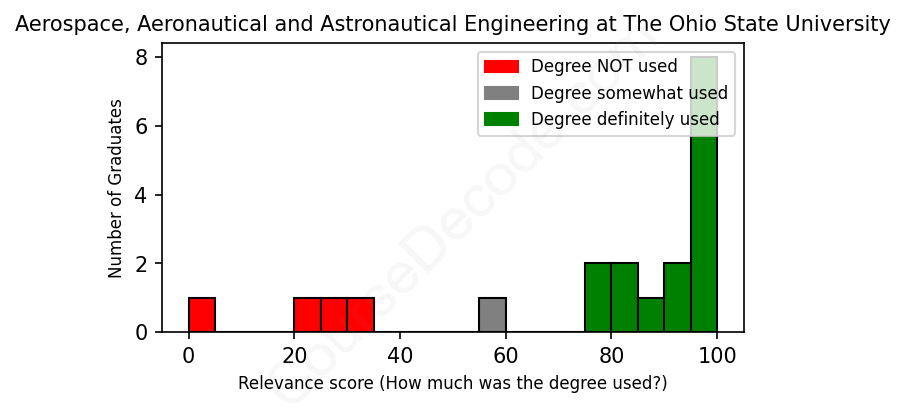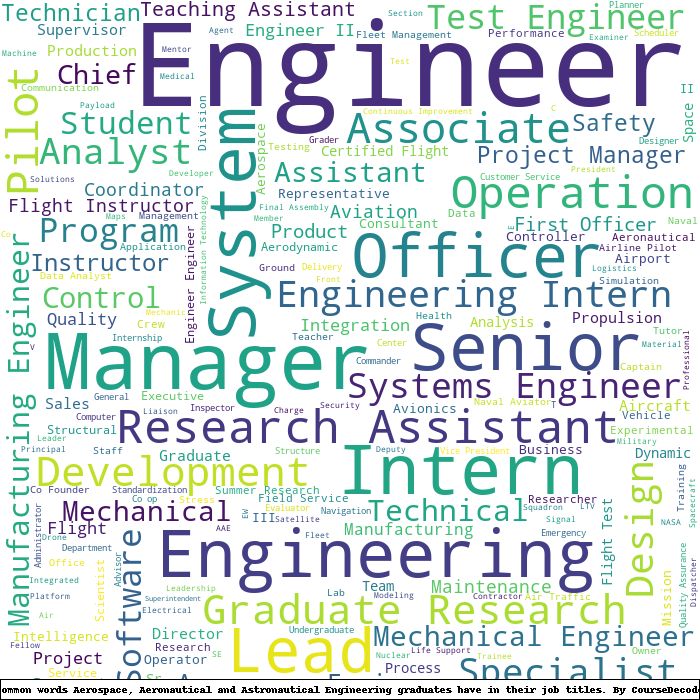
First, some facts. Of the Aerospace, Aeronautical and Astronautical Engineering graduates from The Ohio State University we've analyzed , here's how many have used (or NOT used) their degree in their career:

These are estimates based on AI analysis of 20 LinkedIn profiles (see below).
The verdict? Above average. Overall, with an average relevance score of 76%, Aerospace, Aeronautical and Astronautical Engineering graduates from The Ohio State University have a higher likelihood (+9%) of finding work in this field compared to the average graduate across all fields:
And for comparison, here's the chart for all profiles we've looked at across all degrees.
Also, after graduating, only 25% of these graduates have pursued further education other than another Bachelor's degree (such as a Masters degree or other), compared to the average across all profiles of 35%. This suggests a Bachelors degree is enough for most Aerospace, Aeronautical and Astronautical Engineering graduates, and it's normal to look for work straight after graduation.
See the details:
|
Relevance score: 59% We think this person has gone into a career only somewhat relevant to their degree. We think this person has gone into a career only somewhat relevant to their degree.
DEGREE INFOGraduated in 2019 from The Ohio State University with a Bachelor of Science - BS in Aerospace, Aeronautical and Astronautical Engineering. No other secondary education since. JOB HISTORY SINCE GRADUATIONConfiguration Management Engineer Eaton Jun 2019 - Dec 2021 Product Engineer  Eaton Oct 2020 - Dec 2021 Project Coordinator  AMS Group, Inc. Nov 2021 - Nov 2022 Project Manager  AMS Group, Inc. Nov 2022 - Present ABOUTNo information provided. |
The top 10 most common jobs done by the graduates we've analyzed (ranked most common to least) are:
When looking at the job paths of graduates from The Ohio State University with degrees in Aerospace, Aeronautical, and Astronautical Engineering, it’s clear that a good number of them have ended up in roles that are quite relevant to their field of study. Many have taken positions with companies like GE Aerospace, SpaceX, and Belcan Engineering, where they work as Mechanical Design Engineers, Repair Engineers, and various engineering specialists. These types of jobs directly involve the application of aerospace engineering principles, making them a perfect fit for what they learned during their studies. The trend shows that graduates indeed utilize their specialized knowledge, especially in roles that demand technical skills related to aerospace systems and engineering design.
However, it’s also important to note that not every job taken by these graduates is strictly aerospace-focused. Some recent graduates found themselves in roles like food service or project management, which do not necessarily need the full depth of aerospace knowledge. For instance, positions involving project management or customer support appear to lean more on general engineering or analytical skills rather than specific aerospace concepts. So, while a good number of alumni are using their degrees in industry-relevant roles, there's still a chunk that ends up in unrelated fields, highlighting a mixed bag of outcomes for aerospace engineering graduates from Ohio State. Overall, those who have maintained a link to aerospace-related jobs seem to have made the most of their education and training, while others might be exploring different avenues outside the scope of their degree.
Here is a visual representation of the most common words in job titles for Aerospace, Aeronautical and Astronautical Engineering graduates (this is across all Aerospace, Aeronautical and Astronautical Engineering graduates we've analyzed, not just those who went to The Ohio State University):

It looks like graduates from The Ohio State University who studied Aerospace, Aeronautical, and Astronautical Engineering tend to have pretty solid career trajectories, especially in the early years after graduation. Many of them kick things off with roles like design engineer, project manager, and research assistant at notable companies in the aerospace field—like GE Aerospace, Boeing, and SpaceX. It's clear that right after they finish their degrees, they’re landing jobs that are not only relevant but also quite prestigious within the engineering community. For instance, a bunch of 2013 graduates went on to work at SpaceX, climbing the ranks to positions like Lead Dynamics Engineer, which is a big deal in the aerospace sector.
Fast forward five to ten years, and many of these alumni still seem to be thriving in engineering roles or moving up into leadership positions. For example, some of those who graduated in 2013 have transitioned from design and dynamics engineering at major companies to roles with more responsibility, like project management and consultancy. However, not every grad follows the aerospace path—there are a few who have taken turns into fields like real estate and even food service, which suggests that while a good number are staying true to their engineering roots, some have found their passions elsewhere. Overall, the data shows that a degree from OSU in this field provides a promising starting point for a successful career, particularly for those who remain focused on aerospace and related industries.
Getting a Bachelor’s degree in Aerospace, Aeronautical, and Astronautical Engineering is generally considered pretty challenging, and that holds true for The Ohio State University as well. You’re looking at a heavy load of math and physics courses combined with technical classes that require a good grasp of complex concepts. Expect to spend a lot of late nights studying and working on projects, especially since teamwork is a big part of the curriculum. While it can be tough and stressful at times, a lot of students find it super rewarding because you’re learning about some really cool stuff, like how airplanes and rockets work. So, if you're passionate about aerospace and ready to put in the effort, you’ll likely find it an engaging and fulfilling experience!
Most commonly, in the LinkedIn profiles we've looked at, it takes people 4 years to finish a Bachelor degree in Aerospace, Aeronautical and Astronautical Engineering.
From what I can see, it looks like a lot of the Aerospace, Aeronautical, and Astronautical Engineering grads from The Ohio State University are making pretty decent money in their careers. Many of them have landed jobs at major companies like GE, SpaceX, and Boeing, which are known to offer competitive salaries and benefits. Plus, roles like "Project Manager," "Senior Dynamics Engineer," and "Mechanical Engineer" typically come with good pay, especially as they gain experience and move up the ladder. However, it's worth noting that a few seem to have taken on roles that might not pay as well initially, like being a research assistant or working part-time while pursuing more education, but that’s often the path to higher-paying positions later on. Overall, it seems like they've got a solid shot at financial success in the aerospace field!
Here is a visual representation of the most common words seen in the "about" section of LinkedIn profiles who have a Bachelor degree in Aerospace, Aeronautical and Astronautical Engineering (this is across all Aerospace, Aeronautical and Astronautical Engineering graduates we've analyzed, not just those who went to The Ohio State University). This may or may not be useful:

Here are all colleges offering a Bachelor degree in Aerospace, Aeronautical and Astronautical Engineering (ordered by the average relevance score of their Aerospace, Aeronautical and Astronautical Engineering graduates, best to worst) where we have analyzed at least 10 of their graduates:
| College | Score | Count |
|---|---|---|
 Texas A&M University Texas A&M University
|
87 | 22 |
 California Polytechnic State University-San Luis Obispo California Polytechnic State University-San Luis Obispo
|
86 | 12 |
 University of Cincinnati University of Cincinnati
|
86 | 10 |
 Purdue University Purdue University
|
85 | 40 |
 Rensselaer Polytechnic Institute Rensselaer Polytechnic Institute
|
85 | 17 |
 Georgia Institute of Technology Georgia Institute of Technology
|
84 | 23 |
 Liberty University Liberty University
|
81 | 21 |
 Iowa State University Iowa State University
|
80 | 16 |
 University of Colorado Boulder University of Colorado Boulder
|
80 | 13 |
 California State Polytechnic University-Pomona California State Polytechnic University-Pomona
|
79 | 13 |
 United States Naval Academy United States Naval Academy
|
77 | 12 |
 The Ohio State University The Ohio State University
|
76 | 20 |
 University of Central Florida University of Central Florida
|
75 | 25 |
 Arizona State University Arizona State University
|
74 | 12 |
 University of Michigan University of Michigan
|
74 | 10 |
 Embry-Riddle Aeronautical University Embry-Riddle Aeronautical University
|
71 | 163 |
 Penn State University Penn State University
|
68 | 12 |
 Florida Institute of Technology Florida Institute of Technology
|
67 | 20 |
 The University of Alabama in Huntsville The University of Alabama in Huntsville
|
67 | 11 |
 Embry Riddle Aeronautical University-Worldwide Embry Riddle Aeronautical University-Worldwide
|
66 | 10 |
 University of Illinois at Urbana-Champaign University of Illinois at Urbana-Champaign
|
48 | 10 |